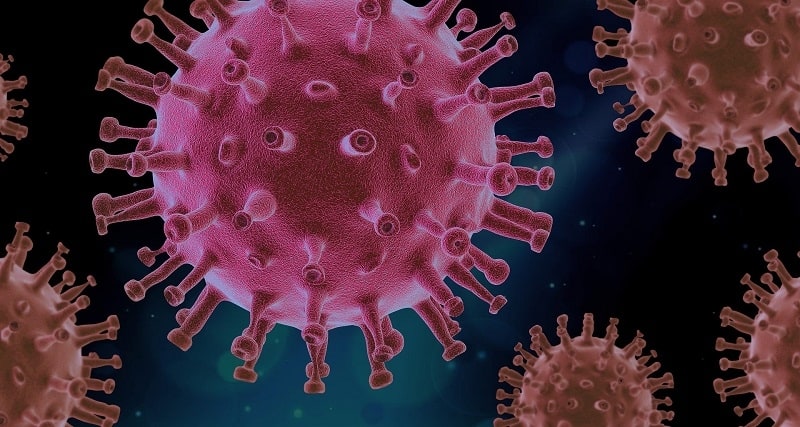The first data are in for Regeneron’s COVID-19 antibody cocktail—and they’re encouraging. The top dose of the treatment lowered virus levels and relieved symptoms more quickly than placebo did in patients infected with COVID-19 but not sick enough to be hospitalized.
The company reported the data in a press release with a promise to publish full results later. They come from the first 275 patients in an adaptive phase 1/2/3 study testing the treatment in non-hospitalized patients with lab-confirmed cases of COVID-19. Patients received the high dose (8 g) or low dose (2.4 g) of the treatment, REGN-COV2, in a single infusion, alongside the standard of care, or placebo with standard of care. More than half of the patients were Hispanic (56%), and 13% were African American.
Before starting the study, patients were tested to see whether they had produced COVID-19-fighting antibodies. About 45% of them had already made those antibodies on their own, while 41% had not made enough antibodies to log a reading. The cocktail seemed to do best in the latter group, with a statistically significant effect on virus levels seven days after treatment compared to patients on the low dose or placebo, the company said in a statement Tuesday. And the higher patients’ virus levels, the greater their reductions.
The drug’s effect on viral load in these patients, known as seronegativity, appeared to dovetail with improvement in symptoms—those on placebo took a median of 13 days to recover from symptoms, but those on the high dose took eight days and those on the low dose took six days.
“The greatest treatment benefit was in patients who had not mounted their own effective immune response, suggesting that REGN-COV2 could provide a therapeutic substitute for the naturally-occurring immune response,” said Regeneron’s president and chief scientific officer, George Yancopoulos, M.D., Ph.D., in the statement. “These patients were less likely to clear the virus on their own, and were at greater risk for prolonged symptoms.”
As for the patients who had mounted their own antibody response, they started the trial with much lower virus levels and managed to clear the virus quickly, even without the antibody cocktail, Regeneron said.
No patients died in the trial, and side effects were minimal. Of the 275 patients, four patients had infusion reactions while two patients suffered severe side effects.
“We are highly encouraged by the robust and consistent nature of these initial data, as well as the emerging well-tolerated safety profile, and we have begun discussing our findings with regulatory authorities while continuing our ongoing trials,” Yancopoulos said.
Regeneron hopes to confirm these findings in a second group of patients, who have already been enrolled. It is also testing the treatment in patients with COVID-19 who are hospitalized and as a preventive treatment in people who have been exposed to COVID-19 patients.
“We plan rapidly to submit detailed results from this analysis for publication in order to share insights with the public health and medical communities. Regeneron continues to enroll patients in this trial and all other ongoing late-stage trials evaluating REGN-COV2,” said David Weinreich, M.D., senior vice president and head of global clinical development at Regeneron, in the statement.
Regeneron’s treatment is a combination of two antibodies that target different areas of the receptor-binding domain on the new coronavirus’s spike protein. The hope is that using two antibodies rather than one could reduce the risk that a mutant, drug-resistant form of the virus will escape treatment and become the dominant strain. AstraZeneca is taking a similar tack, while Amgen, GlaxoSmithKline and Eli Lilly are working on single antibody treatments.
The data are early and, on their own, should not pass muster for an emergency nod from the FDA. But analysts are hopeful if the drug can repeat this performance.
“(Viewed) through the lens of FDA’s urgency around all things COVID, we think this cocktail’s clear reduction of viral load and time to symptom alleviation—primarily in seronegative patients (those who had not mounted an antibody response), combined with a pristine safety profile—if replicated—is likely more than enough evidence for FDA to provide an EUA,” wrote Piper Sandler analyst Christopher Raymond in an investor note Tuesday evening.
“We understand purists will find this data wanting. However, FDA has already shown a willingness and almost eagerness to fast track promising therapies in this setting for obvious reasons, especially if the fall infection wave accelerates,” Raymond added.
As Evercore ISI analyst Josh Schimmer pointed out, “There have certainly been worse EUAs for COVID19.”
Analysts at Jefferies said these data suggest this therapy “could provide an option to help bridge until vaccines are available” and may also show that vaccines generating similar antibody responses “may provide protection.”
Jefferies added that according to conversations “between our US biotech colleagues and Regeneron management,” the company is debating whether to continue with both dose arms (2.4 g and 8 g) or only the low-dose arm (2.4 g).
The analysts were a little more cautious than Evercore’s, and said that while Regeneron is “encouraged,” it remains to be determined whether the data set is deemed good enough by the FDA to nab an emergency nod.
This is also good news for Swiss major Roche, which has a deal to distribute the drug outside the U.S.

